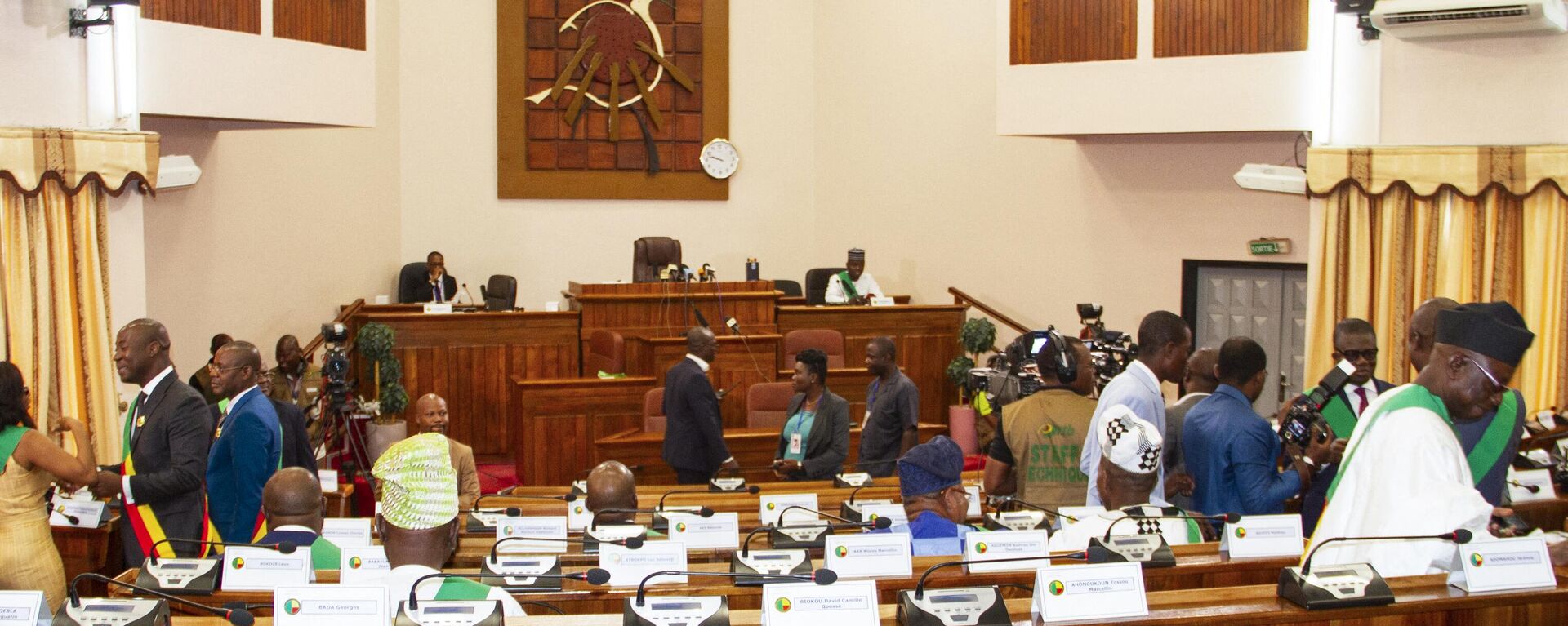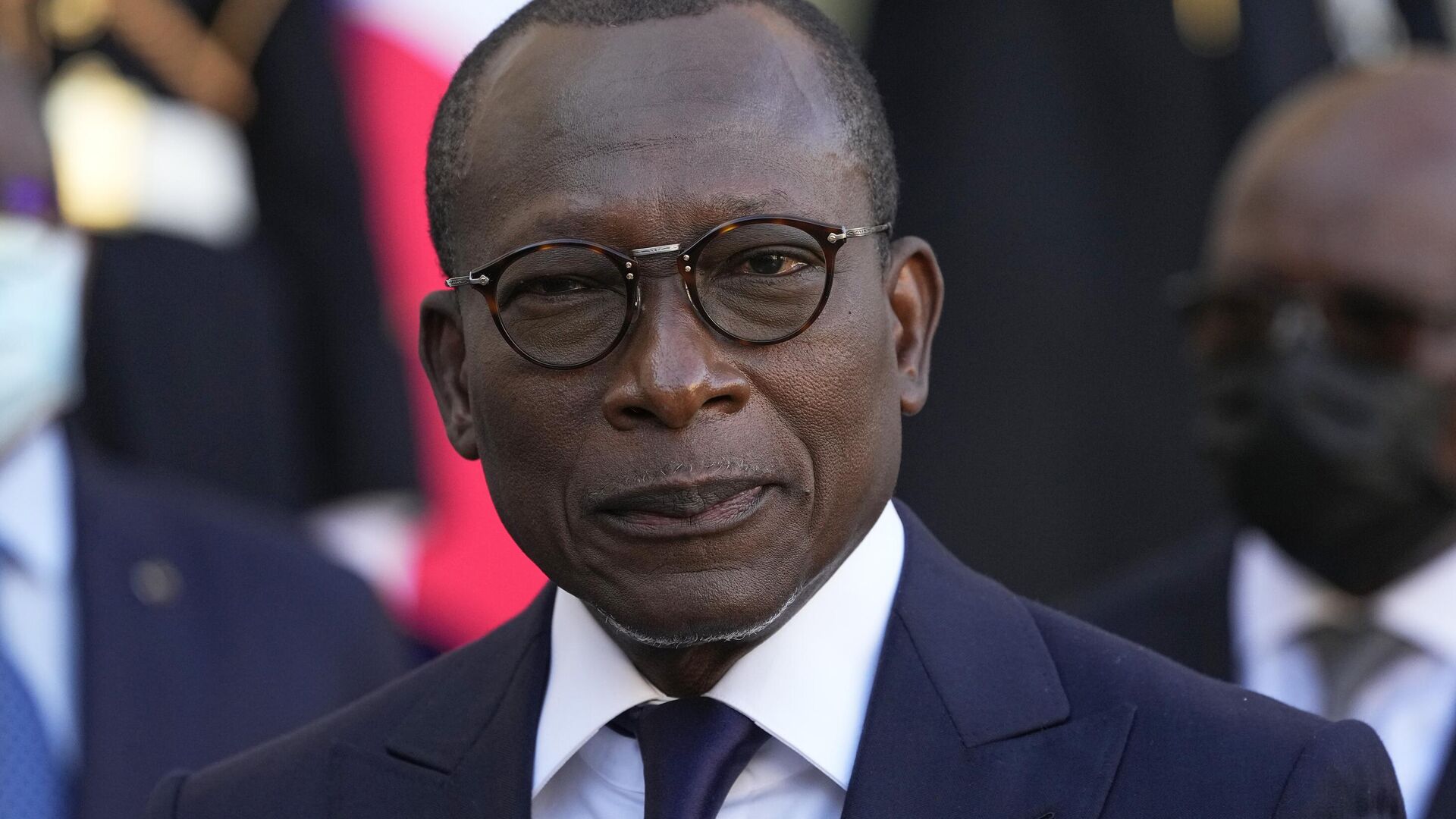https://sputnikglobe.com/20230113/pro-government-parties-win-majority-in-benins-2023-legislative-elections-1106280156.html
Pro-Government Parties Win Majority in Benin’s 2023 Legislative Elections
Pro-Government Parties Win Majority in Benin’s 2023 Legislative Elections
Sputnik International
This article is about pro-government parties winning three-quarters of the seats in Benin's 2023 parliamentary elections, according to the country's constitutional court.
2023-01-13T14:08+0000
2023-01-13T14:08+0000
2024-06-30T14:29+0000
africa
west africa
benin
elections
parliamentary elections
https://cdn1.img.sputnikglobe.com/img/07e7/01/0d/1106291745_0:202:2922:1846_1920x0_80_0_0_10099fb399fa3d413a7a0fed20034121.jpg
Pro-government parties, the Progressive Union for Renewal (UPR) and the Republican Bloc (BR), have won three-quarters of the seats in Benin's 2023 parliamentary elections, the country's constitutional court announced on Thursday.The head of Benin’s Constitutional Court, Razaki Amouda Issifou, said that the BR and UPR parties, both supporting the country’s president, Patrice Talon, won 28 and 53 seats respectively, making a total 81 out of the 109 seats in Benin’s National Assembly.According to the constitutional court, which is tasked with overseeing rulings on election disputes in the West African country, the opposition Democratic Party of Benin (LD) of former president Thomas Boni Yayi secured the remaining 28 seats in parliament.Earlier on Thursday, LD leader Eric Houndete rejected the results of Sunday’s parliamentary election, alleging “blatant” ballot box stuffing, fraud and vote-buying by the two pro-government parties. However, he did not provide any evidence.Voter turnout was 37.79 percent for the elections, which are the first such with an opposition party taking part since Talon came to power in April 2016.The last parliamentary elections in April 2019, saw turnout dropping from 65 percent to 23 percent, marking the lowest turnout in an election since Benin became a democracy. In that election, opposition parties were not able to take part in the legislative ballot because of stricter election rules, which resulted in a parliament being 100 percent controlled by supporters of President Talon.According to local media, winning a majority in the 2023 parliamentary ballot was crucial for the opposition to prepare for the Beninese presidential vote in 2026, when the nation is due to select a successor to Talon, who is now serving his second five-year term.
https://sputnikglobe.com/20230106/benins-opposition-to-participate-in-upcoming-legislative-elections-on-sunday-1106087002.html
africa
west africa
benin
Sputnik International
feedback@sputniknews.com
+74956456601
MIA „Rossiya Segodnya“
2023
Muhammad Nooh Osman
https://cdn1.img.sputnikglobe.com/img/07e4/08/0e/1080170965_2:0:2050:2048_100x100_80_0_0_1de8233c87df0979e7e74f61b6ffacad.jpg
Muhammad Nooh Osman
https://cdn1.img.sputnikglobe.com/img/07e4/08/0e/1080170965_2:0:2050:2048_100x100_80_0_0_1de8233c87df0979e7e74f61b6ffacad.jpg
News
en_EN
Sputnik International
feedback@sputniknews.com
+74956456601
MIA „Rossiya Segodnya“
Sputnik International
feedback@sputniknews.com
+74956456601
MIA „Rossiya Segodnya“
Muhammad Nooh Osman
https://cdn1.img.sputnikglobe.com/img/07e4/08/0e/1080170965_2:0:2050:2048_100x100_80_0_0_1de8233c87df0979e7e74f61b6ffacad.jpg
pro-government parties in benin, parliamentary elections in benin, 2023 parliamentary elections in benin, 2023 beninese parliamentary elections, majority in benin’s 2023 legislative elections,
pro-government parties in benin, parliamentary elections in benin, 2023 parliamentary elections in benin, 2023 beninese parliamentary elections, majority in benin’s 2023 legislative elections,
Pro-Government Parties Win Majority in Benin’s 2023 Legislative Elections
14:08 GMT 13.01.2023 (Updated: 14:29 GMT 30.06.2024) Muhammad Nooh Osman
Writer/Editor
On 8 January, the people of Benin cast their ballot in the country's parliamentary elections, which saw opposition parties take part for the first time since President Patrice Talon came to power in April 2016.
Pro-government parties, the Progressive Union for Renewal (UPR) and the Republican Bloc (BR), have won three-quarters of the seats in Benin's 2023 parliamentary elections, the country's constitutional court announced on Thursday.
The head of Benin’s Constitutional Court, Razaki Amouda Issifou, said that the BR and UPR parties, both supporting the country’s president, Patrice Talon, won 28 and 53 seats respectively, making a total 81 out of the 109 seats in
Benin’s National Assembly.
According to the constitutional court, which is tasked with overseeing rulings on election disputes in the West African country, the opposition Democratic Party of Benin (LD) of former president Thomas Boni Yayi secured the remaining 28 seats in parliament.
Earlier on Thursday, LD leader Eric Houndete rejected the results of Sunday’s parliamentary election, alleging “blatant” ballot box stuffing, fraud and vote-buying by the two pro-government parties. However, he did not provide any evidence.
“The results attributed to the twin parties could only be achieved thanks to the ploys put in place by them to distort the democratic game,” Houndete claimed. “The Democrats party rejects this result, which does not reflect the will of the people to make our party the first political force in our country.”
Voter turnout was 37.79 percent for the elections, which are the first such with an opposition party taking part since Talon
came to power in April 2016.

6 January 2023, 15:22 GMT
The last parliamentary elections in April 2019, saw turnout dropping from 65 percent to 23 percent, marking the lowest turnout in an election since Benin became a democracy. In that election, opposition parties were not able to take part in the legislative ballot because of stricter election rules, which resulted in a parliament being 100 percent controlled by supporters of President Talon.
According to local media, winning a majority in the 2023 parliamentary ballot was crucial for the opposition to prepare for the Beninese presidential vote in 2026, when the nation is due to select a successor to Talon, who is now serving his second five-year term.




